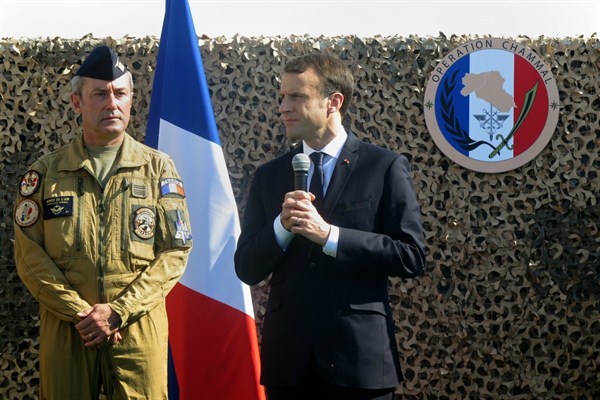On Dec. 7, French President Emmanuel Macron arrived in Qatar for a short yet very profitable visit. It took place in the wake of Qatari Emir Sheikh Tamim bin Hamad Al Thani’s own trip to Paris in September. During his eight-hour stay in Doha, Macron visited al-Udeid Air Base—the largest U.S. military base in the Middle East—where France also has a contingent of soldiers. He was then received at Sheikh Tamim’s administrative office, the Emiri Diwan, to discuss several matters of bilateral interest, as well as the diplomatic standoff in the Gulf, before flying back to Paris.
Macron and Sheikh Tamim signed various defense and transportation agreements totaling $14 billion, the most prominent being Qatar’s purchase of 12 Rafale fighter jets, with an option to buy 36 more. Qatar already acquired 24 Rafales back in 2015, for some $7 billion. The deals also included Qatar’s order for 50 narrow-body jets from Airbus, with an option for 30 more, and a letter of intent to acquire 490 Nexter armored vehicles, worth nearly $1.8 billion. Major civil engineering deals included the $3.5 billion contracts to run the Doha metro and a new tram line north of the city, awarded to the French national railway company SNCF and the Paris metro operator RATP, and a $130 million contract to French utility company Suez to dredge and clean up a vital lagoon.
These deals crown decades of diplomatic and commercial relations since the French Republic was one of the first Western countries to recognize newly independent Qatar in 1971. The tight ties can be measured by the sincere francophilia of the Qatari elite. The emir is an avowed francophone, and Qatar joined the International Organization of La Francophonie in 2012 as an associate member—the only country in the region to be granted such status. Relations never really suffered from changes in French administrations, and although Macron has yet to define his strategy for Gulf countries, one can safely assume that he will not revolutionize his country’s policy in the region.

